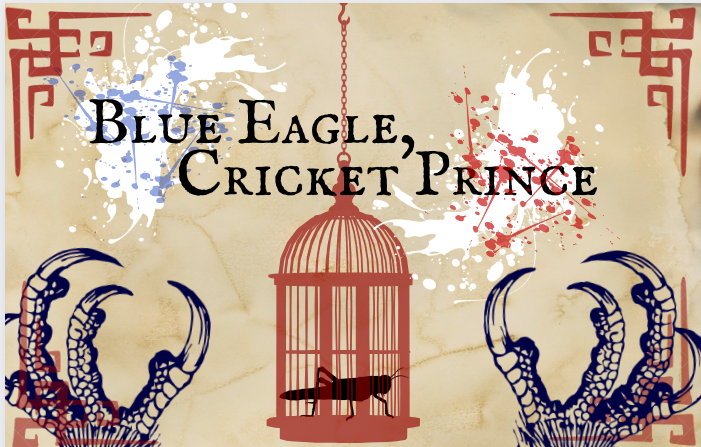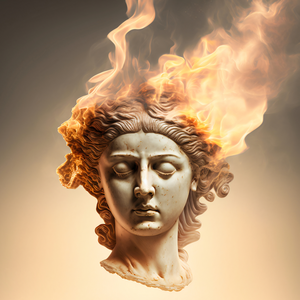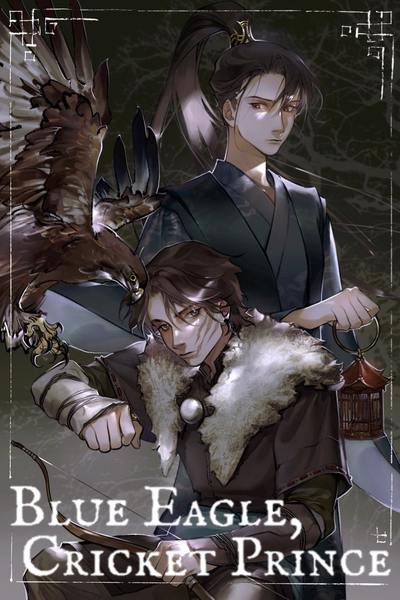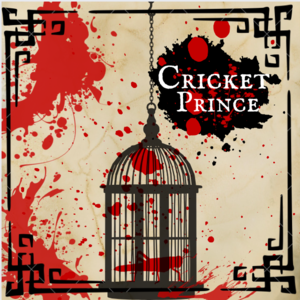Zhisen awakened to the sound of the alarm bell clanging.
Sitting up, he pulled the canopy aside to see out of the window, the smoke rising from beyond the palace walls, in the market district. It's too early for this, he thought. Getting to his feet, he took up his armour from the mannequin, his sword from where it was hooked on the wall, and headed out, helmet in hand. The courtyard was in tumult, the imperial guards rushing from gate to gate, various captains calling out that reinforcements were needed at the market walls now, that they needed to drive the Erdeni out. Or the court could hold to the treaty like I said, and they wouldn’t go to such lengths to even storm the edges of the capital city.
The mayhem allowed him to pass through mostly unnoticed. When he took the reins of a soldier’s horse, the man’s response was only to bow deeply and let him take it. He mounted, kicked its flank, and rode in the direction of the smoke, putting on his helm when the sounds of the fight were clear enough to terrify. The houses seemed to quake with the nerves of the people holed up inside, and the scream of a woman was followed by the screech of an eagle. Zhisen looked up and saw one of the Erdeni hunting birds circling above, wishing he had his bow to shoot it down.
In the market, he dismounted while the stallion still galloped, and it joined the confused fray of Erdeni horsemen and imperial soldiers. Looking up, Zhisen saw bowmen on the battlement, having defeated the imperial guards who had been stationed there. Taking the ruined side of a small fruit crate, he leapt onto a barrel stacked against the side of a house, then pulled himself up onto the roof. As he made his way toward the battlement, one of the bowmen took notice of him and paused in shooting at the soldiers— Zhisen used the piece of wood he’d torn from the crate to block the arrow. Splinters flew up, but he had reached the wall and jumped from the nearest house, gripping the edge of the walkway above.
There was shouting, and Zhisen wasn’t fluent enough in Erdeni to catch what they were saying when they spoke so quickly. The closest man turned toward him. He climbed onto the battlement a moment before his fingers could be crushed by a boot, and just as his body collided with the bowman, he unsheathed the knife strapped to his thigh. His enemy’s throat cut, he oriented himself. There were another four Erdeni in front of him, two behind. None could shoot at him without risking shooting each other. One with a blue sash charged from behind, the other with a yellow sash from in front, swords drawn.
Closing his eyes, Zhisen took a deep, calming breath. As he exhaled, the roar of the battle below quieted to a hum, and he opened his eyes. Easily, he sidestepped the blade of the man at his back, unsheathing his own sword to cross with the man before him. Steel rang out, three times before he ducked beneath the swing of the yellow-sashed man to change his position. He faced the two of them together, avoiding being run through the second time. His back faced the sheer drop outside the city gates, and his sword caught blow after blow, the blue-sashed man now on the offensive while his comrade held back.
Zhisen let the tide of their fight turn, and walked slowly backward, closing the distance with the lone bowman on the right side of the gate. He felt the bowstring tightening, the arrow directed for the centre of his spine as he neared. Then, as the vibration pierced through the wind, Zhisen parried in earnest, the blue-tasseled sword losing its force. Zhisen planted one foot on the blue-sashed man’s thigh, then the other on his shoulder, propelling himself and leaping up. He flipped over in the air as the arrow struck through the heart of the blue-sashed man, and, upside-down, he met eyes with the archer.
His boots struck the stone again, and he whirled around on his heel, drawing his dagger to throw it before another arrow could be nocked. Before the man behind him could avenge his comrades, Zhisen ducked low to the ground, avoided the swing of his blade, and swept out his right leg behind himself. The Erdeni warrior’s weight fell on his back as Zhisen rose, and with a shove, leaning to the left, Zhisen threw him over the side of the battlements. The crack of his skull resounded through the fight, and his yellow sash stained with blood, but Zhisen faced the last three men, who had unsheathed their swords against him.
He made quick work of them— after all, they were all in front of him. It was as easy as pushing through ranks of trainees in the dojo, and with eight swings of his blade, he felled them. When he faced the tower which flanked the westernmost side of the battlement above the gates, the roar of the fighting in the marketplace returned to him. He saw no quick way to go down without using the stairs, and as he was about to do so, he paused to check who was in the fight.
Most of the Erdeni wore scarves and were difficult to tell apart save from their clothes and blades— but he had been careful to learn over the long course of their unstable alliance these things. He recognized the curving blade on the spear of Inalchi, the son of Chief Olai of the Tohkta clan, sister clan to Adkirag, whose chief was the Emperor of the Erdeni Confederation. If Inalchi is here, he thought, the Erdeni have not taken the trade ban well, as I expected. Zhisen searched for any men of the Adkirag clan.
The spices and dust that were kicked up in the fight made a mess of everything, but the uniformity of the imperial soldiers made his job easier. There were a few horses who trampled men and crushed plates of armour— their riders were all Erdeni princes. Sitting astride the most beautiful black mare was Khojin Adkirag, the first and only son of the Emperor of the Erdeni Confederation, Tolon. He drew back his bowstring with such speed and surety that he slew men as easily as if he wielded a long spear like Inalchi. He was always difficult to mark in battle, for there was nothing special about his bow or his clothes— but Zhisen suspected him by his marksmanship and recognized his face. He had a strong jaw, a strong nose, strong brows. A triangular section of his right ear was torn off, and the scars leading to his ear drew three parallel lines along his cheek.
Rather than rough, though, he was imposing.
His scarf fell away when his mare reared on her hind legs, but he gripped her mane and with the sheer strength of his legs was not kicked off. The Erdeni nomads were people of the horse and the bow— Khojin Adkirag was the most fearsome among their warriors, more than even his father, who had razed the former Jirandai capital before Zhisen had been born.
Zhisen saw his advantage— none of the Erdeni on the ground seemed to notice that their battlement archers were slain, now that imperial reinforcements trickled in from all sides. He ran to pick up the bow of one of the men he had killed and took off his helmet to improve his view. He nocked an arrow and put a foot up on the edge of the battlement, drawing back the bowstring. He aimed and raised his voice above the din, shouting as loudly as he could. “Khojin Adkirag! Tell your men to stand down, or I’ll shoot!"
Every man had heard his voice, and within seconds, the dust settled over a deadly silence. But the stillness revealed Khojin had drawn back his bowstring, too. Their arrows aimed directly for each the other’s heart. Inalchi’s voice cut the silence. He spoke steadily enough that Zhisen understood him. “Khojin, shoot him before more soldiers come. I will not hold my arm back any longer.”
“Be quiet,” Khojin told him, and then switched to Jirandai. “You— what is your name?”
Zhisen was faintly confused. “We’ve met, and you don’t know my face?”
“The sun is behind you,” Khojin said. “I cannot see it.”
“Zhisen Haoda.”
Khojin’s expression shifted toward recognition. “Ah, Your Highness.” Saying it, he bowed his head mockingly. “On the count of three, we shall both lower our bows, and you will tell your men to also stand down. Then we will go, you and I together, to the Imperial City, and I will cut your throat if my life is threatened at any point on the way. Yes?” He paused. The silence between the soldiers was tense. “I have a message from my father for the Emperor, and I’m not fool enough to kill you, just as you’re not fool enough to kill me.”
Zhisen laughed. “And I suppose I’ll just let your men carry away the entire market stock with them?”
“The ban on trade has lasted weeks, and we have run out of rice and millet. Whether or not you let us take what we need now or later, we will have the supplies all the same. I believe you’re the shrewd prince? You should know that we will raid your cities until the court puts an end to this foolishness.” Of course, he was right, but Zhisen was surprised at his Jirandai vocabulary. When they’d met before, Khojin had seemed to him a man of four or five words at a time. “I’ve come for the sake of discussion, so let us go about this diplomatically, Prince Zhisen. If we kill each other now, our fathers will go to war.”
There wasn’t much choice. Besides, Zhisen wanted the trade to start again, even if it meant that the Erdeni would continue to be paid for peace in those exorbitant tributes— his father would at least desist in sending him to quell these insignificant raids. That way, he could finally get back to focusing on his own plans.
So, Zhisen spoke such that he could be heard as well as Khojin. “Everyone stand down.” Every imperial sword in the market was sheathed at once, resoundingly and mechanically, without a moment of hesitation. After that, Khojin said something quickly and tersely to Inalchi, who spat on the dirt before driving the point of his spear into the ground by his steed’s hooves. He laid his hand on top of the pole so that it would not tip over, but he was in no position to kill any nearby soldiers without warning.
The other Erdeni followed suit. Quiet hung over the courtyard, and Zhisen said, “Three.”
“Two,” Khojin said, lowering his bow so that it aimed at the earth— Zhisen followed.
“One,” Zhisen said, and as he un-nocked his arrow, Khojin mirrored him. He tossed the arrow across the battlements, and it skittered while Khojin put his own arrow back in his quiver. Zhisen tossed the bow down, too, and headed for the stairs. Khojin’s eyes followed him until he disappeared into the stairwell.
When he emerged, their eyes met instantly. Khojin told him, “Throw me your sword.”
“Dismount from your horse first,” Zhisen said, unhooking the sheath from his belt.
A couple of the imperial soldiers were openly gawping at him, as if to ask what was in his head, making deals with the barbarians? But they’d thank him later— letting the Erdeni raid the city any further was a terrible mistake, as bad as it had been to ban them from the markets. Even bolstering superior numbers, the Jirandai could never hope to fully defeat the Erdeni. After all, they had no fixed lands to conquer.
With a thump, Khojin landed on the cobblestones as if getting on and off a horse was his second nature. He was much taller than he seemed astride his mare, but Zhisen had never seen him off a horse before. When he took the first step forward, Zhisen saw under the shadows of his long coat, sashes, and scarves— he was wearing pieces of cord-and-plate armour. It was probably stolen from an imperial soldier he had killed. Zhisen almost recoiled, but he tossed his sword instead. Khojin did not catch it— rather, he seemed to snatch it out of the air.
His reflexes appeared inhuman by the way he grasped the sheath alone. He took one more step before he stopped and stood still, about two strides away. At that distance, Zhisen could see the weirdness of his left eye, two-thirds of it as black as his right, the rest as blue as a clear sky.
Khojin said, “Your knives.”
Zhisen unsheathed the ones on his right thigh and his left arm, tossing them down, and met Khojin’s eyes again. He was clean-shaven, which he’d always been, but which was strange. Most distinguished Erdeni men kept a well-cut beard— was he trying to emphasize his youth to accent his military prowess? Was he trying to emulate Jirandai fashion? Zhisen didn’t understand, now or ever.
Khojin’s voice, like a churning river, rushed through again. “All of your knives.”
Zhisen became somewhat impressed. Unable to withhold some laughter, he lifted his upper-body armour over his head and tossed it at the closest soldier, who fumbled to catch it, shoulder plates clanging. With as much subdued irritation as he could muster for the show, although he was rather unbothered by it, Zhisen pulled his vest open and retrieved the small blade sheathed in its inner pocket. The wind was cold against his chest, so as he tossed the knife down, he closed his vest again. Khojin secured Zhisen’s sword on his sash and said, “Come here.”
Zhisen felt his facial expression get tight. ‘Come here?’ What am I, a dog? Rot at the bottom of Igtze River, Erdeni scum. Rather than articulating his scorn, Zhisen said, “Pardon me? Your accent is so thick.”
It was not. They had understood each other perfectly until now, but Zhisen was not going to be condescended to in front of so many soldiers without at least retorting— he had to save face. Khojin’s indifferent expression did not so much as twitch. “You.” He pointed. “Here.” He gestured at the ground in front of him. Then, like it was an easy request and not a demonstration of power, he added, “If you please.”
Zhisen made the two steps to stand in front of him. “Apologies,” Khojin said, and swiftly had turned him around, looped an arm round his neck, and put a dagger to his throat. The flat of the blade pressed against his skin, cold and well-polished. Several swords were being unsheathed around the courtyard, but Khojin said, “Stop.”
They did pause. Zhisen decided to illuminate them. “We agreed this. If any of you are so deaf you did not hear, I recommend you visit a physician and get the earwax cleaned out.”
The swords were left to slide back into their sheaths, and a path toward the street leading to the palace was made. Zhisen started walking first and tried not to laugh when Khojin suddenly loosened his grip to avoid cutting him. It took all of two paces to fall into step— clearly, Khojin still had grace on the ground.
But gods above— “You stink of horses,” Zhisen said in an undertone, switching to Erdeni.
“So, you do know my tongue.”
“I do. And are you familiar with the word ‘bath?’” Saying it, he used the Jirandai word.
"And you— do you know our word for quiet?"













Comments (5)
See all